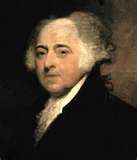My husband plays clarinet in a community band. It's a mixed group of professional musicians, many of them retired, students, people who only began to play an instrument recently, and those who have played for decades. The average age of the players is probably around 70. From September to June they play a 2-hour concert once a month in a local community center to an enthusiastic audience. They specialize in marches and show tunes.
For the last few years my father-in-law and I sit in the audience and enjoy the show, tapping our feet to the peppy pieces and singing along to familiar songs. It's pleasant and we have a good time. But...the music isn't always that good. Often in the past it lacked a certain energy...a certain polish.
This past Sunday the band blew our socks off and played for 2 1/2 hours and had us all applauding and begging for more. People were out of their seats and very excited.
So what was different? Well, the band had a new conductor. That was the only difference...and what a difference it was.
- Energy and Focus: The new conductor, although a few years older than the previous one, had a spring in his step, a smile on his face, and an energetic conducting style. It wasn't flamboyant but it was active. Great leaders do that. They exude energy and focus. In fact, new research underway at MIT is measuring this to demonstrate the difference between the merely adequate and the great leader.
- Engagement: As the new conductor put the band through its paces, he made eye contact with different sections, subtly bringing them in, building their sound or lowering their volume. He engaged with individuals and sections to bring out the best in them. Great leaders do that. When they are talking with you, you are the only person in the room. Your own energy level increases and your performance moves toward your true capabilities.
- Highlighting Achievement and Talent: The new director composed a program with the usual marches and show tunes but with a twist. Each one highlighted a particular section -- the brass, the winds, the drums, etc. Each tune gave a whole section the opportunity to strut their stuff and shine in front of the audience. He also had several pieces that featured individual members up front soloing and demonstrating their unique talents. Leaders are proud of the talents of their teams and want them to shine. Great leaders don't have to be the center of attention or the best at everything.
- Making the best with what you have: The community band has a diversity of talent. Some members aren't very good while a few are outstanding musicians. But what makes such a band possible is that everyone is there because they want to be. They enjoy playing music whether they are particularly good at it or not. The former band leader used to spend a lot of time fussing at people, trying to get them to play better. The new director talks about the music with them -- its meaning, origin, and subtleties. Leaders do that naturally. They get everyone focused on a goal -- in this case, playing a particular piece of music as well as possible. They have a clear mission -- bring enjoyment to the community through their music making. He keeps them focused on the goal and mission -- they do their best on their own to meet those.
- Challenge the Team to Excel: The former conductor would always include at least one or two 'serious' pieces -- usually a little slow (even draggy.) All they managed to do was highlight the lack of talent in some players when the tempo slowed and individual instruments were harder to hide in the ensemble. The new conductor had a different approach that both challenged the players and, again, got the best out of them. First, he lengthened the program by about 20 minutes, adding more pieces. Second, he had one more challenging piece, still in the genre the band does best. The band was a little apprehensive but they came through with flying colors -- or rather soaring sound. Their energy was a little lower by the end but still higher than all of last season. Leaders help their teams build on their strengths and remind people of the confidence they have in them.
His transformation of the band reminded me of a quote from Dr. W. Edwards Deming about work and leadership:
Why are we here? We are here to come alive...to have joy in our work.
The band leader brought joy to his players, the audience, and to himself. Strike up the band for your own leadership.
*** *** *** *** *** ***
(c) Rebecca Staton-Reinstein, president, Advantage Leadership, Inc.
For more about learning from great leaders, check out Conventional Wisdom: How Today's Leaders Plan, Perform, and Progress Like the Founding Fathers, available at http://www.conventionalwisdomcenter.com/
Learn more about how Rebecca and her team can help you develop your own strategic leadership and that of your team at http://www.advantageleadership.com/
















